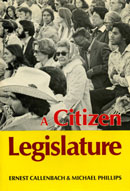

|
|

A Citizen Legislature
Callenbach, Ernest; Phillips, Michael
Publisher: Banyan Tree Books, Bodega CA 94710, USAYear Published: 1985 Pages: 90pp ISBN: 0-9604320-5-1 Library of Congress Number: JF1059.U6C35 1985 Dewey: 328.3042 Resource Type: Book Cx Number: CX3310 Arguing from the premise that the present electoral system is unrepresentative and promotes corruption, the authors propose going back to the Athenian system of choosing representatives: by lottery. Abstract: Although this is a U.S. book, its basic idea could as easily be applied to Canada or other countries. Arguing from the premise that the present electoral system is unrepresentative and promotes corruption, it proposes going back to the Athenian system of choosing representatives: by lottery. They propose that representatives be chosen in a way very similar to the way juries are currently selected. They argue that this would produce a much better cross-section of the population than the current electoral system, which is heavily weighted in favour of the well-off rather than the less well-off, men rather than women, the old rather than the young, business people and professionals rather than working class people, dominant groups rather than disadvantaged minorities. They argue strongly that this system would produce representatives at least as competent and conscientious as the present system. They say that the "election process as practiced in our media age rewards candidates who have congenial TV images, have a convincing verbal delivery, and are adept at sensing transient public emotional moods. These qualities do not necessarily correlate with either intelligence or responsible political leadership. It is certainly not obvious, in any case, that our present representatives are really the kind of people we would ideally want to have making critical, life-and-death decisions for us. Nor is there any convincing evidence that they are superior in wisdom, judgment, compassion, and sense of reponsibility to ... people chosen by sortition from the citizenry at large. The latter would certainly have, among themselves, a livelier and more realistic sense of the life of the country and its pressing problems; they would have a more varied collective experience to draw upon, and they would not be constrained in their thinking by a desire to cosset corporations." They predict that under such a system a small percentage of representatives would just keep the salary and stay home. This, they say, is no different than what happens now. [Abstract by Ulli Diemer] Table of Contents: Preface 1. The Founders' Ideal: The Legislature as a Transcript of the People 2. The Present Electoral System is both Unrepresentative and Corrupt 3. The Democracy of Athens Offers a Better Model: Selection by Lot 4. Direct Representation Is Scientifically Reliable 5. A Cross-Section of the People Would Be Selected 6. A Representative House Would Frame Political Issues in Unique New Ways 7. The Representative House Would Restore the Difference Between the House and Senate 8. The Representative House Would Develop Its Own Organization 9. The Representative House Would Better Serve The General Welfare 10. The Representative House Would Be Equivalent to the Nation as a Whole 11. The Representative House Would Be At least as Competent as the Present House 12. The New House Would Be No More Easily Manipulated Than the Present House 13. The New House Would Be Less Corruptible Than the Present House 14. Members of the New House Will be Representative Even When Absent 15. Campaign Funding Reforms Will Not Solve the Problems of the Electoral System 16. The Initiative Process Cannot Solve the Current Problems of Proper Representation 17. Electronic Technology Cannot Solve the Current Problems of Proper Representation 18. The New House Would Save the Taxpayers Money 19. The New House Would Offer Exciting Benefits to Chosen Representatives 20. The Representative House Would Encourage Cooperation Among Members 21. Democratic Representation Would Strengthen the Republic 22. The Representative House Would Not Disturb the Balance of Power 23. The Senate Would Remain and Represent State and Party Interests 24. The Representative House Would Respond More Rapidly to New Problems 25. The Representative House Would Restore a Sense of Citizenship 26. Practical Implementation Is Possible, Beginning on the State Level. Responses Subject Headings |